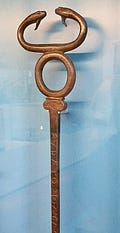Homer's Odyssey δ 4.696-714
Adapted from the edition of M. L. West:
Greek text hyperlinked to lexica via Perseus (perseus.tufts.edu):
τὴν δ᾽ αὖτε προσέειπε Μέδων πεπνυμένα εἰδώς:
‘αἲ γὰρ δή, βασίλεια, τόδε πλεῖστον κακὸν εἴη.
ἀλλὰ πολὺ μεῖζόν τε καὶ ἀργαλεώτερον ἄλλο
μνηστῆρες φράζονται, ὃ μὴ τελέσειε Κρονίων:
Τηλέμαχον μεμάασι κατακτάμεν ὀξέι χαλκῷ
οἴκαδε νισόμενον: ὁ δ᾽ ἔβη μετὰ πατρὸς ἀκουὴν
ἐς Πύλον ἠγαθέην ἠδ᾽ ἐς Λακεδαίμονα δῖαν.’
ὣς φάτο, τῆς δ᾽ αὐτοῦ λύτο γούνατα καὶ φίλον ἦτορ,
δὴν δέ μιν ἀμφασίη ἐπέων λάβε: τὼ δέ οἱ ὄσσε
δακρυόφι πλῆσθεν, θαλερὴ δέ οἱ ἔσχετο φωνή.
ὀψὲ δὲ δή μιν ἔπεσσιν ἀμειβομένη προσέειπε:
‘κῆρυξ, τίπτε δέ μοι πάϊς οἴχεται; οὐδέ τί μιν χρεὼ
νηῶν ὠκυπόρων ἐπιβαινέμεν, αἵ θ᾽ ἁλὸς ἵπποι
ἀνδράσι γίγνονται, περόωσι δὲ πουλὺν ἐφ᾽ ὑγρήν.
ἦ ἵνα μηδ᾽ ὄνομ᾽ αὐτοῦ ἐν ἀνθρώποισι λίπηται;’
τὴν δ᾽ ἠμείβετ᾽ ἔπειτα Μέδων πεπνυμένα εἰδώς:
‘οὐκ οἶδ᾽ ἤ τίς μιν θεὸς ὤρορεν, ἦε καὶ αὐτοῦ
θυμὸς ἐφωρμήθη ἴμεν ἐς Πύλον, ὄφρα πύθηται
πατρὸς ἑοῦ ἢ νόστον ἢ ὅν τινα πότμον ἐπέσπεν.’
Samuel Butler’s translation with certain names Hellenised:
Then Medon said, “I wish, Madam, that this were all; but they are plotting something much more dreadful now — may heaven frustrate their design. They are going to try and murder Telemachus as he is coming home from Pylos and Lacedaemon, where he has been to get news of his father.”
Then Penelope’s heart sank within her, and for a long time she was speechless; her eyes filled with tears, and she could find no utterance. At last, however, she said, “Why did my son leave me? What business had he to go sailing off in ships that make long voyages over the ocean like sea-horses? Does he want to die without leaving any one behind him to keep up his name?”
“I do not know,” answered Medon, “whether some god set him on
to it, or whether he went on his own impulse to see if he could find out if his father was dead, or alive and on his way home.”
My English translation (as well as Greek):



